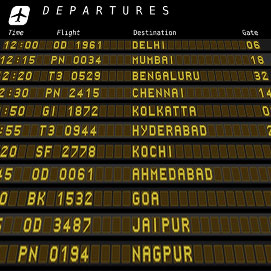IATA calls for resolution to India’s aviation crisis
- Like
- Digg
- Del
- Tumblr
- VKontakte
- Buffer
- Love This
- Odnoklassniki
- Meneame
- Blogger
- Amazon
- Yahoo Mail
- Gmail
- AOL
- Newsvine
- HackerNews
- Evernote
- MySpace
- Mail.ru
- Viadeo
- Line
- Comments
- Yummly
- SMS
- Viber
- Telegram
- Subscribe
- Skype
- Facebook Messenger
- Kakao
- LiveJournal
- Yammer
- Edgar
- Fintel
- Mix
- Instapaper
- Copy Link
Posted: 25 July 2012 | IATA | No comments yet
IATA called for an “India Inc.” approach to resolve India’s aviation crisis and improve competitiveness to drive economic benefits…


The International Air Transport Association (IATA) called for an “India Inc.” approach to resolve India’s aviation crisis and improve competitiveness to drive economic and social benefits.


Aviation in India supports 1.7 million jobs, 0.5% of GDP and 90% of international tourist arrivals. “That’s impressive but it could and will be much more. Today, India is a market of about 100 million passengers annually. Looking ahead, if Indians traveled as much as Americans, we would see a market potential of over 2 billion travelers,” said Tyler. Despite this great potential, India’s airline industry is struggling financially. Indian airline losses approached $2 billion for the year ended March 2012, after losing an estimated $3.5 billion over the three previous years.
“A bright future is at hand for Indian aviation if we can find common purpose among all stakeholders. India must not settle for a bronze medal in global aviation. If we can take deliberate action on a handful of critical issues—reducing taxes, ensuring capacity and keeping costs in check—a gold is entirely possible. And the benefits of such an effort will be shared across the entire economy,” said Tyler.
Tyler called for urgent action as follows:
High Costs: “The high cost of doing aviation business in India is squeezing the lifeblood out of the airline sector. Infrastructure costs and taxes need urgent attention,” said Tyler who focused his comments on airport charges and fuel taxes.
Airport Costs: “India’s airports are becoming increasingly expensive,” said Tyler. The Airports Economic Regulatory Authority (AERA) approved a 346% increase in charges at Delhi Airport effective from May 2012. The increase will add over $400 million in operating costs for airlines providing connectivity to India through Delhi.
“An increase of this magnitude will impact travel demand by 5-7%. That’s bad for airlines, for passengers, for Delhi International Airport Private Limited (DIAL), for the Delhi hub, for Delhi as a city and indeed for India and its economy as a whole. We need to focus on how to make Delhi a more competitive airport, a successful hub and a major driver of economic growth,” said Tyler.
To operate Delhi’s airport, DIAL pays 46% of top line revenue to the Airports Authority of India (AAI) as a concession fee, much of which is used to subsidize other public sector airports. “This is in contravention of international standards, distorts competition and compromises Delhi’s cost competitiveness,” said Tyler.
“I urge the government to initiate deliberations on utilizing the 46% concession fee to offset the increase in aeronautical charges and the cost for passengers. This could be the basis for a way forward that protects the interests of DIAL, its airline customers, the fare-paying public, and the economy. And it is important that we find a workable solution soon to avoid Mumbai, with a similar concession structure, falling into the same dire situation,” said Tyler.
Taxation: Aviation can deliver the greatest value to national coffers by facilitating business that expands the tax base. “Unfortunately, many Indian Ministries see aviation as a revenue source, rather than as a revenue generator,” said Tyler.
The Ministry of Finance imposes a service tax on air tickets, landing and navigation charges. This contravenes International Civil Aviation Organization (ICAO) policies. India’s airlines are also taxed on domestic fuel that can add an additional 30% to the fuel bill. On top of that is an excise duty of 8.2%. As a result, fuel is about 45% of total operating costs for Indian carriers, compared to a global average of 33%.
“Taxes may provide short-term gain for finance ministries at various levels of government but they are compromising the initiatives and strategic priorities of other ministries,” said Tyler. India’s Commerce Ministry wants to increase India’s exports to $500 billion by 2013-14—double the 2010-11 level. The Tourism Ministry is targeting 10 million tourists by 2017 nearly double the 5.7 million arrivals expected this year. “Reducing the tax burden on connectivity will be a critical element of success for both these efforts with more competitive business travel, more cost-efficient shipping and a more inviting welcome for 90% of international tourists who arrive by air,” said Tyler.
Capacity: Tyler called for expedited work to expand capacity in Mumbai. “A new airport is needed in Mumbai or economic opportunities will be lost. I am pleased to see that Prime Minister Manmohan Singh has recognized the urgency of the situation and thrown his weight behind moving the Navi Mumbai airport project forward on a fast track. The 12th Indian Five Year Plan projects 274 million passengers flying in 2017. A ‘super-fast track’ way forward may have to be developed to meet that expectation,” said Tyler.
Access Tony Tyler’s full speech













